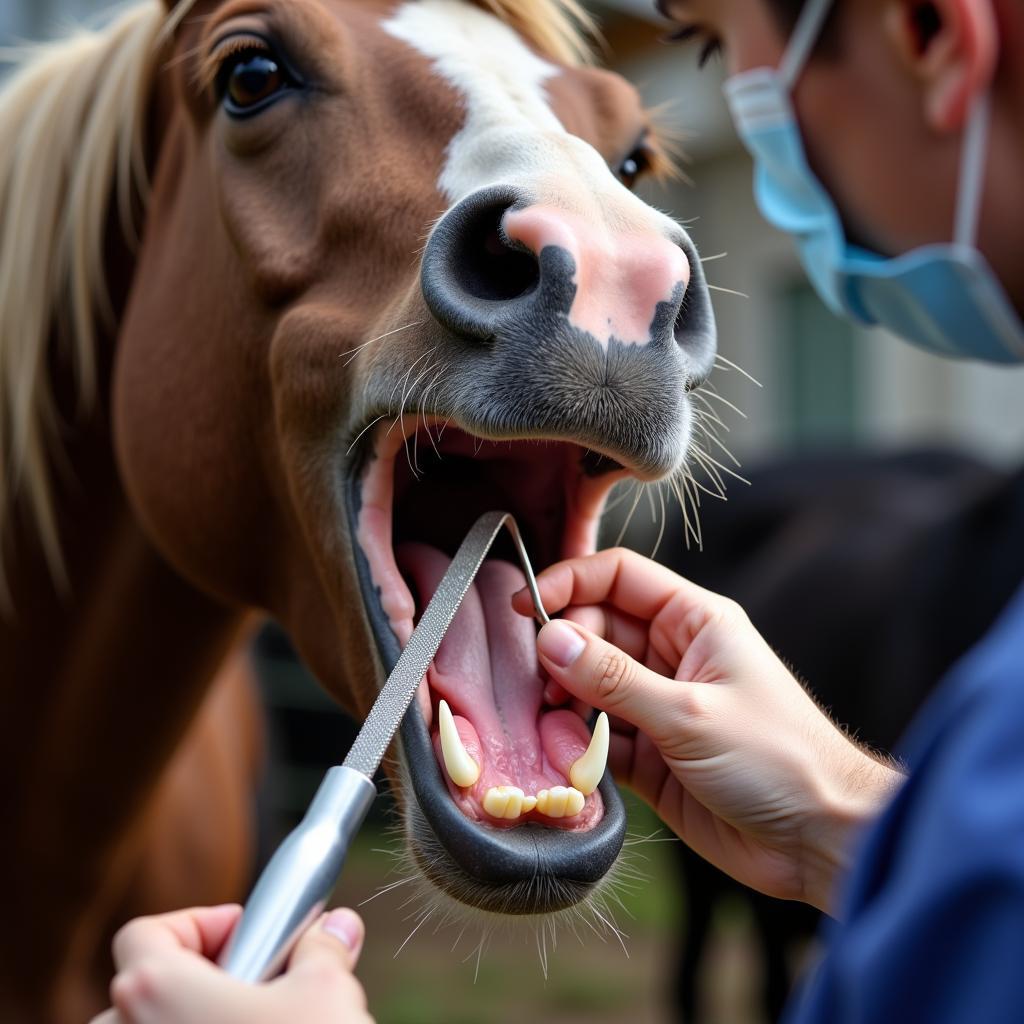The dental speculum for horses is an essential tool used by equine dentists and veterinarians to safely and effectively examine and treat a horse’s teeth. It gently separates the upper and lower jaws, providing a clear view of the molars and premolars, which are located deep within the horse’s mouth and are not easily visible otherwise. Understanding the importance of this tool, its different types, and proper usage can contribute significantly to your horse’s overall health and well-being.
Why is a Dental Speculum Necessary?
Horses have hypsodont teeth, which means their teeth continuously erupt throughout their lifetime. While this allows them to graze on tough grasses, it also makes them prone to developing sharp enamel points, hooks, and other dental problems that can interfere with chewing, causing discomfort, and even leading to serious health issues.
A dental speculum allows equine professionals to:
- Conduct a thorough oral examination: Identify sharp enamel points, hooks, tooth decay, periodontal disease, and other abnormalities.
- Perform routine dental procedures: Such as teeth floating, which involves rasping off the sharp enamel points to create a smoother chewing surface.
- Extract loose or damaged teeth: This procedure requires specialized instruments and often sedation.
- Administer medications: The speculum can facilitate the delivery of oral medications to the back of the horse’s mouth.
 Equine Dental Examination with Speculum
Equine Dental Examination with Speculum
Types of Dental Speculums
Several types of dental speculums are available, each with its own advantages and disadvantages:
1. Full Mouth Speculums: These speculums provide the widest opening of the mouth and are suitable for most dental procedures. They consist of two metal arms that are inserted into the horse’s mouth and then opened using a ratchet mechanism.
2. Half Mouth Speculums: Also known as “wedges,” these are smaller and more portable than full mouth speculums. They are useful for quick examinations or for working on a specific area of the mouth. They are held in place manually and don’t offer the same stability as full mouth speculums.
3. Modified Speculums: These speculums are designed for specific procedures, such as tooth extraction or treating a specific dental problem. They may have unique shapes or features to facilitate these procedures.
4. Power Speculums: These specialized speculums use hydraulic or electric power to open and close the jaws, providing greater control and reducing strain on the operator.
Choosing the Right Speculum
The type of dental speculum used will depend on several factors, including:
- The horse’s temperament: A calm horse may tolerate a full mouth speculum, while a more anxious horse may require a half-mouth speculum.
- The procedure being performed: A routine dental checkup may only require a half mouth speculum, while a more complex procedure, such as tooth extraction, will require a full mouth speculum.
- The experience level of the operator: Experienced equine dentists may be comfortable using a wider range of speculums, while those with less experience may prefer to start with simpler models.
Using a Dental Speculum Safely
Using a dental speculum on a horse should only be done by a qualified professional. Improper use can cause injury to the horse’s mouth, teeth, or jaw. Here are some safety considerations:
- Proper restraint: The horse must be adequately restrained, either in a stock or with the assistance of handlers.
- Gentle handling: The speculum should be inserted and removed slowly and carefully to avoid causing pain or discomfort to the horse.
- Monitoring for signs of stress: Watch for signs of stress in the horse, such as head tossing, pawing, or pulling back. If the horse becomes too agitated, the procedure should be stopped.
The Importance of Regular Dental Care
Regular dental care is crucial for horses of all ages. It is recommended to have your horse’s teeth checked by an equine dentist or veterinarian at least once a year, or more frequently for senior horses or those with known dental problems. Early detection and treatment of dental problems can help prevent more serious issues down the road, ensuring your horse lives a long and healthy life.
Frequently Asked Questions about Dental Speculums for Horses
1. Is it painful for a horse to have a dental speculum used?
When used correctly by a trained professional, a dental speculum should not cause significant pain. Some pressure and discomfort might occur, but this is usually minimal and temporary.
2. Can I use a dental speculum on my horse myself?
No, it is not recommended to use a dental speculum on your horse yourself. Only a qualified equine dentist or veterinarian should perform dental procedures on horses.
3. How often should my horse’s teeth be checked?
It is recommended to have your horse’s teeth checked at least once a year, or more often for senior horses or those with existing dental issues.
4. What are the signs of dental problems in horses?
Signs of dental problems in horses can include difficulty chewing, weight loss, quidding (dropping food), head shaking, and behavioral changes.
5. Can dental problems affect my horse’s overall health?
Yes, dental problems can significantly impact a horse’s overall health. Untreated dental issues can lead to pain, malnutrition, and even colic.
Do you want to learn more about how to care for your horse’s teeth? Read our articles on tooth root abscess horse and teeth floating horses to understand these common equine dental issues.
Need Help with Your Horse’s Dental Health?
For personalized advice and assistance with your horse’s dental care, reach out to our experts. Contact us at Phone Number: 0772127271, Email: [email protected] or visit our location at QGM2+WX2, Vị Trung, Vị Thuỷ, Hậu Giang, Việt Nam. Our dedicated team is available 24/7 to answer your questions and provide the best possible care for your equine companion.